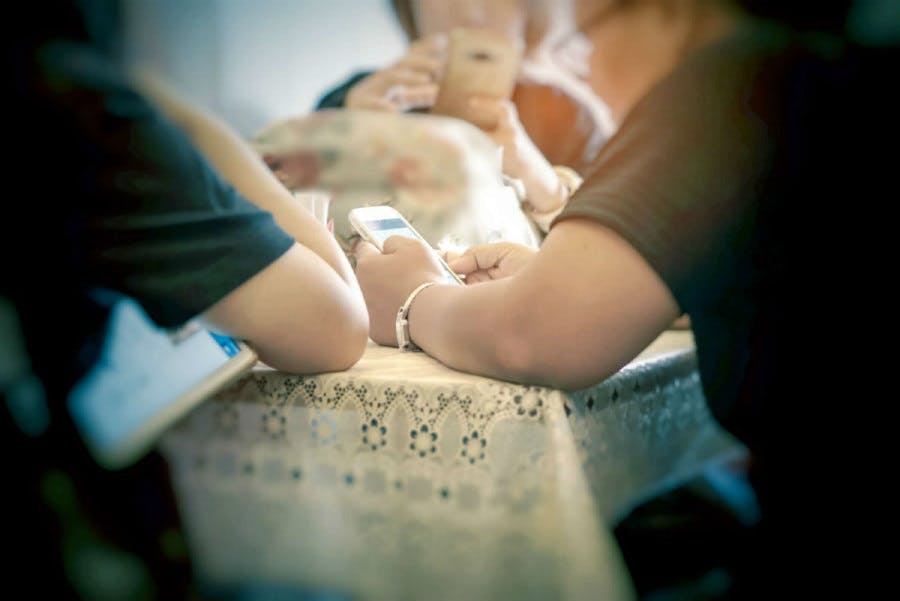Picture this - you’re eating with your friends or family. The food is excellent, the setting is warm and friendly, and the conversation is flowing nicely. Everyone is having a good time.
Then it happens. Someone pulls out their phone. Maybe they need to take a call, or maybe they just want to show you a picture of their cute pets. Or maybe they just need to quickly look something up that’s relevant to your conversation.

Sharing photos of family or pets can’t be a hurtful action, can it?
Before you know it, everyone is on their smartphone. Scrolling, flicking, swiping and texting as they forget the world around them.
What happens next? The conversation stalls, people stop paying attention to where they are and who they’re with. They are so fixated on the screen in front of them that they start to ignore their surroundings
If this sounds familiar, then congratulations! You have encountered “phubbing”!
What is “phubbing”?
Phubbing is a portmanteau of “phone” and “snubbing”. It is used to describe the behaviour of snubbing someone in favour of a mobile phone.
The phrase was coined during an advertising campaign run by the McCann advertising agency for the Australian Macquarie Dictionary. The agency asked for submissions for a new word to describe the behaviour. The word "phubbing" is attributed to an Australian college student named Alex Haigh, who had been interning at McCann while the campaign was running.
The fact is that the behaviour associated with frequent checking of smartphones, tablets and other devices is a biological drive. Our brains have mechanisms that reward behaviours that engage with variable or unpredictable patterns. And we get a hit of dopamine when something unexpected and benign occurs.

Phubbing is the result of a reward mechanism in the brain.
Dopamine is a chemical that helps control your brain’s reward and pleasure centers. It is released when something unexpected or pleasurable occurs.
Say you go to the pantry looking for something to snack on. One day you find a packet of biscuits you didn’t know was there. You get a small hit of dopamine. Now, everytime you walk past the pantry, your brain will remember that experience and encourage you to open the pantry door to check for unexpected snacks.
This is the same mechanism that can trap people with addictive behaviours. Somewhat alarmingly, the behaviours encouraged by our smartphones have the potential to become as addictive as gambling.
What does it do to us?
Pulling out the smartphone seems like such an innocent action. Yet the action itself seems to speak volumes about the value we are placing in our surroundings and circumstances.
We might be thinking “I’ll just take a cheeky peek at my phone, see if that message has come through”. But the action itself is basically asking the people around us to put their conversation and communications on hold while we do something that we could easily dismiss as being soft and meaningless.
The result is that those around us feel just a little less important. And the relationship we share with those nearby feels a little less certain.
It’s not just a feeling.
In 2015, researchers from the Hankamer School of Business of Baylor University published a study that showed the detrimental effects of phubbing and related behaviours.
The researchers found that the act of phubbing removed the connection from interpersonal relationships, damaged romantic relationships, and contributed to circumstances that made people feel depressed.
Checking a phone during a shared mealtime.
- Placing or keeping a phone in their line of sight during time together.
- Keeping a phone in hand or in reach when spending time alone together.
- Answering a call or responding to a message in the middle of a conversation.
- Glancing at a phone when in the middle of a conversation.
- Checking a phone during lulls in conversation.
It’s easy to see how these behaviours can impact on a sense of worth during a conversation with a partner, relatives or close friends. The actions seem to imply a sense of casual disinterest in the surrounding circumstances, including the people present.

The actions involved in phubbing may seem harmless, but they can impact those around us.
This may not be the case. It is hard to imagine a scenario where someone whose time we treasure would set out to dismiss our presence as less important than checking for a text message.
But the impact remains, regardless of the intent.
So what can we do to minimise this behaviour?
We keep checking our mobile devices because our brains reward us for taking a chance at engaging in behaviour that may result in us seeing something we like - a message, a tweet, a picture from friends far away. That’s not to mention the games. We all know how hard it can be to put down a fun little game we found on our phone.
But there are some simple tactics you can employ to help break the pattern.
The phone stack
This one is great for family gatherings or nights out with friends and can provide a little bit of fun for those of us who are okay with putting their phones down for a time.
The action is in the name - everyone puts their phone in a stack on the table, face down. The first person to reach for their phone has to pay the price. If you’re eating out, they have to pay the bill. If you are eating in, they have to do the washing up.
Practicing the phone stack will help to put everyone on the same page, and apply a penalty for those that breach etiquette. It makes the behaviour fun and normalises the practice of ignoring your phone in favour of the people around you.
Institute a no-tech hour
This is more of a house rule, but it’s one you can extend to include family, friends, and visitors who come around. In essence, you set a time - say an hour or two each day - that is technology free. You can specify the technologies that are to be switched off at this time, such as smartphones, tablets and laptops. Or you can broaden your definition to mean “no technology with screens” if that’s an easier definition to follow. However you choose to define it, the idea is to encourage people to put their devices away and engage in more analogue activities.

Having a “no-tech hour” can help people reconnect.
So, in this case, it’s okay to read books, catch up on what’s happening via the newspaper, sit around and chat. But it’s not okay to sit around and share pictures you have found online.
This has the beneficial effect of encouraging more human-centric activities at a dedicated time of the day. It also does not demonise people for wanting to keep in contact via portable and handheld devices the rest of the time.
Keep your chargers in public space
This one small tactic can have a powerful knock-on effect. The practice is simple - just place the charging cables for your devices out in the lounge room, dining room, rumpus room, or other space in the house that is open to everyone. This means places like the bedroom, den, study and other areas that are considered private are now cable-free zones.
By keeping your chargers out in public, people have to come in and plug in their devices at a central, social part of the house. Here they are more likely to engage in conversation as their devices charge.
At the same time, this keeps devices out of some of the more relaxed times of day, such as first thing in the morning and late in the evening. This removes the temptation to check for messages first thing upon waking or last thing before bed. These habits can promote anxiety and stress - two things that you don’t need on waking or before sleeping.
A secondary benefit of this practice is that it keeps screens that emit blue light out of the bedroom. Blue light has been shown to promote wakefulness - a condition you don’t want to promote when winding down from the day.
The keystone to stopping phubbing
While the practices mentioned above can help eliminate the practice of phubbing at certain times and in certain situations, there is one activity that can help reduce the incidence overall and make sure that more socially acceptable standards stick.
Have a frank, open discussion about the phubbing behaviour, and the effects it is having on you and those around you.

Talking through the effects of phubbing may help to improve people’s understanding of their behaviour.
During this conversation, explain how the physical actions involved make you feel. The emphasis of the discussion should be on negotiation and compromise, so everyone is clear that you are not trying to overlook everyone’s needs. Use examples to show that it is not the person’s intent to cause a negative reaction, and attempt to define some boundaries you can agree on.
And of course, be sure to practice what you preach. There’s little point in making a big speech about the hurtful feelings you experience when getting phubbed if you are also engaging in the behaviour!
With a little conversation and compromise, it should be possible to remove the negative effects of phubbing from your daily interactions.